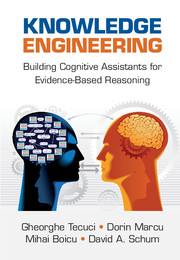Book contents
- Frontmatter
- Contents
- Preface
- Acknowledgments
- About the Authors
- 1 Introduction
- 2 Evidence-based Reasoning: Connecting the Dots
- 3 Methodologies and Tools for Agent Design and Development
- 4 Modeling the Problem-Solving Process
- 5 Ontologies
- 6 Ontology Design and Development
- 7 Reasoning with Ontologies and Rules
- 8 Learning for Knowledge-based Agents
- 9 Rule Learning
- 10 Rule Refinement
- 11 Abstraction of Reasoning
- 12 Disciple Agents
- 13 Design Principles for Cognitive Assistants
- References
- Appendixes
- Index
1 - Introduction
Published online by Cambridge University Press: 05 September 2016
- Frontmatter
- Contents
- Preface
- Acknowledgments
- About the Authors
- 1 Introduction
- 2 Evidence-based Reasoning: Connecting the Dots
- 3 Methodologies and Tools for Agent Design and Development
- 4 Modeling the Problem-Solving Process
- 5 Ontologies
- 6 Ontology Design and Development
- 7 Reasoning with Ontologies and Rules
- 8 Learning for Knowledge-based Agents
- 9 Rule Learning
- 10 Rule Refinement
- 11 Abstraction of Reasoning
- 12 Disciple Agents
- 13 Design Principles for Cognitive Assistants
- References
- Appendixes
- Index
Summary
UNDERSTANDING THE WORLD THROUGH EVIDENCE-BASED REASONING
We can try to understand the world in various ways, an obvious one being the employment of empirical methods for gathering and analyzing various forms of evidence about phenomena, events, and situations of interest to us. This will include work in all of the sciences, medicine, law, intelligence analysis, history, political affairs, current events, and a variety of other contexts too numerous to mention. In the sciences, this empirical work will involve both experimental and nonexperimental methods. In some of these contexts, notably in the sciences, we are able to devise mathematical and logical models that allow us to make inferences and predictions about complex matters of interest to us. But in every case, our understanding rests on our knowledge of the properties, uses, discovery, and marshaling of evidence. This is why we begin this book with a careful consideration of reasoning based on evidence.
What Is Evidence?
You might think this question is unnecessary since everyone knows what evidence is. However, matters are not quite that simple, since the term evidence is not so easy to define and its use often arouses controversy. One problem with the definition of evidence is that several other terms are often used synonymously with it, when in fact there are distinctions to be made among these terms that are not always apparent. Quite unnecessary controversy occurs since some believe that the term evidence arises and has meaning only in the field of law.
Consulting a dictionary actually does not assist us much in defining the term. For example, look at the Oxford English Dictionary under the term evidence and you will be led in a circle; evidence is ultimately defined as being evidence.
A variety of terms are often used as synonyms for the term evidence: data, items of information, facts, and knowledge. When examined carefully, there are some valid and important distinctions to be made among these terms, as we will now discuss.
Evidence, Data, and Information
Consider the terms data and items of information.
Data are uninterpreted signals, raw observations, measurements, such as the number 6, the color “red,” or the sequence of dots and lines “…–…”.
Information is data equipped with meaning provided by a certain context, such as “6 am,” “red traffic light,” “red tomato,” or the “S O S” emergency alert.
- Type
- Chapter
- Information
- Knowledge EngineeringBuilding Cognitive Assistants for Evidence-based Reasoning, pp. 1 - 45Publisher: Cambridge University PressPrint publication year: 2016



